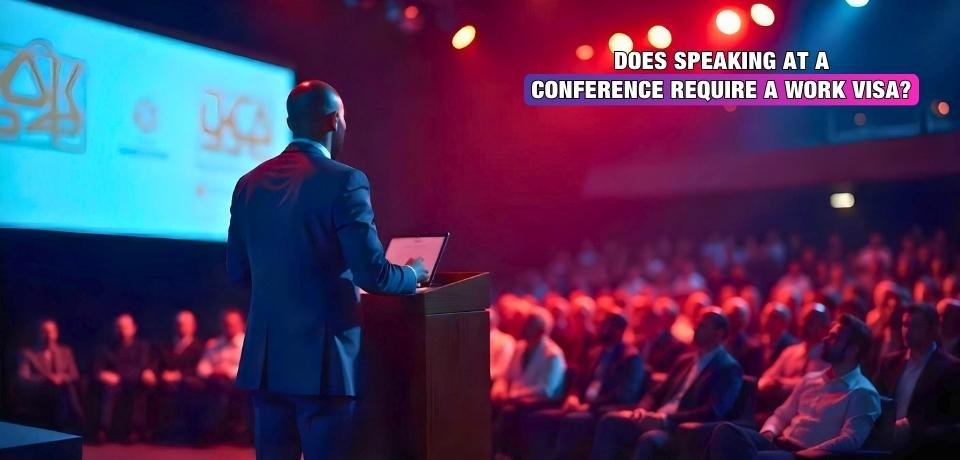Speaking at a conference is an exciting opportunity to share knowledge, connect with peers, and make a lasting impact in your field. From delivering a keynote to leading workshops, presenting at an international event can open doors to global networking. But one important question arises: does speaking at a conference require a work visa?
Depending on how the host country defines “work” and “employment,” you may indeed need a work visa. If your activities are considered work — such as delivering presentations, conducting training, or leading sessions — you may indeed need a work visa.
This article will walk you through what you need to know about visa requirements for conference speakers, so you can focus on making the most of your experience. Read on to learn more!
Why Should You Speak at a Conference?
Speaking at a conference is a powerful way to share your expertise, gain visibility, and expand your professional reach. It’s an opportunity to connect with like-minded individuals and learn from others in your field. Here are some compelling reasons why you should consider stepping up to the podium:
- Build credibility and authority in your field by sharing insights that highlight your knowledge. Audiences view speakers as trusted experts, which enhances your reputation.
- Connect with industry leaders and peers, opening doors for future collaborations. Conferences offer unique face-to-face networking you can’t replicate online.
- Enhance your professional growth by diving into new trends and insights. Speaking allows you to stay updated and gain fresh perspectives.
- Increase visibility for your personal brand, positioning yourself as a thought leader. A strong presence on stage often leads to further speaking invitations.
- Refine your public speaking skills in a real-world environment, growing more comfortable with each presentation. It’s a great way to develop confidence and clarity.
- Inspire others with your knowledge, creating a memorable impact on attendees. Your ideas can spark new conversations and motivate others to take action.
Does Speaking at a Conference Require a Work Visa?
Yes, in many cases, speaking at a conference may require a work visa, but the specifics vary widely. Whether you need a visa depends on factors like the country, the nature of your participation, and the event’s requirements. Knowing these details in advance can help you prepare properly and avoid last-minute issues.

Type of Activities at the Conference
The type of activity you’re undertaking plays a big role in determining visa requirements. If your role involves delivering a keynote, leading sessions, or running a workshop, it could be classified as “work” by some countries. This classification may lead to the need for a work visa rather than a tourist or visitor visa, as is the case when working on a Canadian conference visa.
However, passive participation, like attending sessions or networking without actively presenting, usually doesn’t require a work visa. Countries may have specific guidelines, so knowing the regulations for your activities is essential. Clarifying your role in advance can prevent unexpected travel complications.
Duration of Your Stay
Short stays for a brief presentation may have different visa requirements compared to longer, more involved visits. Some countries allow short-term speaking engagements under a business or visitor visa if the stay is limited. This can be an option if your conference commitment is only a few days.
Longer commitments or extended workshops may cross into work visa territory due to the duration alone. Visa rules often tighten with extended stays, even if the activities remain the same. Always check how your trip’s length could affect the visa needed for your event.
Whether You’re Paid or Compensated
Paid engagements at conferences often signal a need for a work visa, even if the activity is brief. Many countries see paid work, including stipends or compensation for expenses, as employment. This requires specific documentation to enter and work legally.
Unpaid speaking may still fall under “work” but might not trigger visa requirements as strict. However, some locations still ask for work visas for unpaid engagements to maintain immigration controls. It’s best to know if any compensation, even indirect, will affect your visa needs.
Country-Specific Visa Regulations
Each country has unique immigration laws, meaning requirements for conference speakers vary by destination. For example, some places are strict, requiring work visas for most professional activities. In contrast, others may have special exemptions for business or cultural events.
Some countries offer simplified short-term work visas that apply to specific conference roles. These visas may have faster processing but still need careful adherence to guidelines. Researching the regulations of your destination is crucial to understanding your legal standing as a speaker.
Type of Conference and Industry
Certain conferences, particularly in industries like technology or academia, may have more lenient visa policies for speakers. For instance, educational or government-sponsored events might offer easier visa routes. However, commercial or profit-driven events often require stricter adherence to work visa policies.
Industries with sensitive information or security protocols might impose additional documentation. This could apply even if the event’s overall purpose is informational. Understanding how your conference’s industry impacts visa requirements can save you time and help you prepare.
Your Citizenship and Visa Exemptions
Your citizenship can also influence whether you need a work visa for conference speaking. Some countries have visa waiver agreements allowing short-term entry without a visa, including specific professional engagements. Speakers from visa-exempt countries may enjoy smoother entry to conferences.
However, even visa-exempt travelers must sometimes declare work activities and show proof of event participation. Regulations can change frequently, so it’s wise to confirm the latest requirements based on your nationality. A quick check on exemptions can help avoid any surprises.
How to Obtain a Work Visa for Speaking at a Conference?
Obtaining a work visa for speaking at a conference can be straightforward if you understand the steps involved. Proper preparation helps ensure a smooth process, allowing you to focus on delivering a great presentation. Here’s a step-by-step guide to help you get through the application.

Step 1: Identify the Type of Visa Required
Start by determining the specific visa type required for your role at the conference. Different countries classify speaking engagements under various visa categories, such as business, visitor, or work visas. Confirming this early can save you time and prevent delays in your application. Review official government websites or consult with the event organizer for guidance.
Step 2: Gather Necessary Documentation
Once you know the visa type, gather all required documents, as each visa application has specific paperwork requirements. You’ll typically need an invitation letter, proof of conference participation, and possibly details on any compensation. Having these ready in advance speeds up the process and reduces the chance of errors. Make sure all documents are up-to-date and meet the standards of the issuing country.
Step 3: Submit Your Application and Pay Fees
After gathering your documents, complete the visa application and pay any associated fees. Many countries allow online applications, simplifying the process and enabling you to track your application status. Be thorough and double-check all details to avoid potential issues that may cause delays. Keep receipts and confirmation emails for reference until the visa is approved.
Step 4: Attend an Interview if Required
Some visa applications may require an interview at an embassy or consulate, so be prepared if this is a step. Interviews provide an opportunity to clarify your purpose for entering the country and demonstrate your compliance with visa rules. Practice discussing your conference activities clearly and professionally to make a strong impression. Bring all required documents to avoid rescheduling due to missing information.
Step 5: Follow Up and Plan Your Travel
Once your application is submitted and, if necessary, your interview is complete, follow up as needed to check the status. Visa processing times can vary, so allow sufficient time to receive approval before your travel date. Avoid booking non-refundable travel until your visa is secured to prevent unexpected costs. Once approved, review all visa details to ensure accuracy for a hassle-free entry.
Work visas may seem complex, but if you approach the process step-by-step, you’ll be well prepared. For instance, understanding the specific requirements for a visa to attend a conference in Canada can simplify your preparations. With the right approach, you can focus on making the most of your time at the event and sharing your expertise confidently.
Common Mistakes People Make With Working Visa Applications
Applying for a working visa can be challenging, and small mistakes can lead to delays or rejections. Many applicants overlook important details or misunderstand requirements, which can complicate the process. Here are common mistakes people make with working visa applications and how to avoid them:
- Failing to provide accurate information can lead to visa rejection or prolonged delays. Always double-check all details before submission to avoid errors.
- Missing important deadlines or filing too late often results in rushed applications. Give yourself ample time to gather documents and complete forms.
- Overlooking specific document requirements is a common error that can halt an application. Review the checklist carefully to ensure you’re fully prepared.
- Not understanding the visa category that suits their work can complicate the application process. Research the correct visa type to match your job purpose.
- Submitting incomplete applications happens when applicants skip sections or forget attachments. Incomplete forms are often returned, prolonging the application process.
- Misinterpreting visa conditions, like work limits or employer restrictions, can create problems later. Knowing these details can help avoid accidental violations.
What are the Requirements for Speaking at a Conference?
You can showcase your expertise, connect with peers, and expand your professional influence by speaking at a conference. However, there are specific requirements to meet before stepping onto the stage. From visa considerations to preparing a compelling presentation, here’s what you need to know to be fully prepared.

Relevant Visa or Travel Authorization
If the conference is international, you’ll likely need a visa or travel authorization specific to the country’s requirements. Some countries require work visas for speakers, even if the event is unpaid. Knowing the right category prevents last-minute travel issues and ensures legal compliance. Always check your host country’s guidelines well in advance to avoid any surprises.
Acceptance of Speaking Proposal
Most conferences require you to submit a detailed proposal for review before acceptance as a speaker. This proposal often includes an abstract, key topics, and objectives that align with the event’s theme. Organizers use this to assess your presentation’s relevance and audience value. A clear, concise proposal can significantly increase your chances of selection.
Professional Bio and Presentation Materials
Organizers typically request a professional bio and, in some cases, preliminary presentation materials ahead of time. A bio should highlight your expertise, accomplishments, and relevance to the event topic. Presentation slides or outlines are often reviewed to ensure quality and alignment with event goals. Having polished materials ready demonstrates professionalism and builds credibility with the audience.
Clear Understanding of Audience Expectations
Knowing your audience’s needs and knowledge level is crucial to delivering an engaging presentation. Researching the demographic and professional backgrounds of attendees can help tailor your message effectively. This insight guides your language, examples, and presentation style for maximum impact. Understanding expectations ensures your talk resonates with the audience and keeps them engaged.
Preparation for Q&A Sessions
Many conferences include a Q&A session after each talk, which requires additional preparation from the speaker. Anticipating questions related to your topic helps you answer confidently and thoroughly. Practicing responses to potential questions can also improve your comfort on stage. Handling Q&A sessions well leaves a positive impression on attendees.
Adherence to Event Guidelines and Time Limits
Each conference sets specific guidelines regarding timing, content format, and technical requirements for speakers. Following these guidelines demonstrates respect for the organizers and keeps the event running smoothly. Staying within time limits is essential to maintain flow and prevent delays. Familiarizing yourself with these rules ensures a seamless and professional experience.
Tips to Help You Have an Impactful Speaking Season at a Conference
Making an impact as a speaker requires more than delivering information; it’s about creating an experience that resonates with your audience. A well-prepared speaker leaves a lasting impression, inspires attendees, and often gains valuable professional connections. Here are some essential tips to make your speaking season truly impactful:
- Know your audience’s background and expectations to personalize your presentation effectively. Aligning your content to their needs enhances engagement and relevance.
- Practice your delivery to ensure smooth, confident communication during your talk. A well-rehearsed presentation helps reduce nerves and enhances clarity.
- Engage with attendees before your session to create rapport and build anticipation. Early connections make the audience more receptive to your message.
- Use stories and examples that make complex ideas relatable and memorable. People remember stories far better than abstract concepts or statistics.
- Encourage audience interaction through questions, polls, or discussions to maintain energy in the room. Interaction keeps everyone involved and heightens the learning experience.
- Have a clear takeaway or action step for your audience to apply after the session. Providing actionable steps increases the practical value of your talk.
Speaking at a conference is a unique opportunity to share knowledge and make connections that matter. Implementing these tips can help you create a memorable and impactful speaking season, ensuring that your message leaves a lasting impression.
Frequently Asked Questions About Does Speaking at a Conference Require a Work Visa?
When planning to speak at a conference abroad, understanding visa requirements is essential to avoid travel or legal issues. Here are some frequently asked questions about work visas and conference speaking to help clarify your journey.
Can I Attend a Conference as a Speaker Without Compensation and Avoid a Work Visa?
In many countries, even unpaid speaking engagements can require a work visa, as the activity may still be classified as “work.” Some places, however, allow unpaid speakers under business or visitor visas. Always confirm your specific destination’s rules.
How Early Should I Apply for a Work Visa to Speak at a Conference?
Applying early, ideally, several months in advance, is recommended to avoid processing delays. Visa processing times vary by country and application type, and last-minute applications may be denied, putting your speaking engagement at risk.
Do I Need a Work Visa if My Conference is Only a Few Days Long?
In many cases, short-term engagements still require a work visa if you’re actively speaking. Some countries allow short-term business visas, but it depends on their classification of “work,” so checking specific requirements for your stay is vital.
What Happens if I Speak at a Conference Without the Correct Visa?
Entering a country on an incorrect visa type can lead to penalties, fines, or future travel restrictions. You could also face deportation and potentially harm your professional reputation, so it’s essential to confirm the appropriate visa before travel.
Are There Any Exceptions for Non-Profits or Academic Conferences?
Some countries offer special allowances for speakers at non-profit or academic events, potentially reducing the need for a work visa. However, these exemptions vary widely, and it’s crucial to verify the rules based on your specific conference type and location.
Concluding Thoughts
A conference is an incredible opportunity to share insights, build a reputation, and network. However, understanding the logistical requirements, especially around visas, is essential.
For those wondering, does speaking at a conference requires a work visa, it depends on many factors, such as location, compensation, and type of participation. Careful preparation and early research can ensure your experience is seamless and impactful.
By knowing what’s required and following best practices, you can focus on delivering a memorable presentation and making the most of this exciting opportunity.